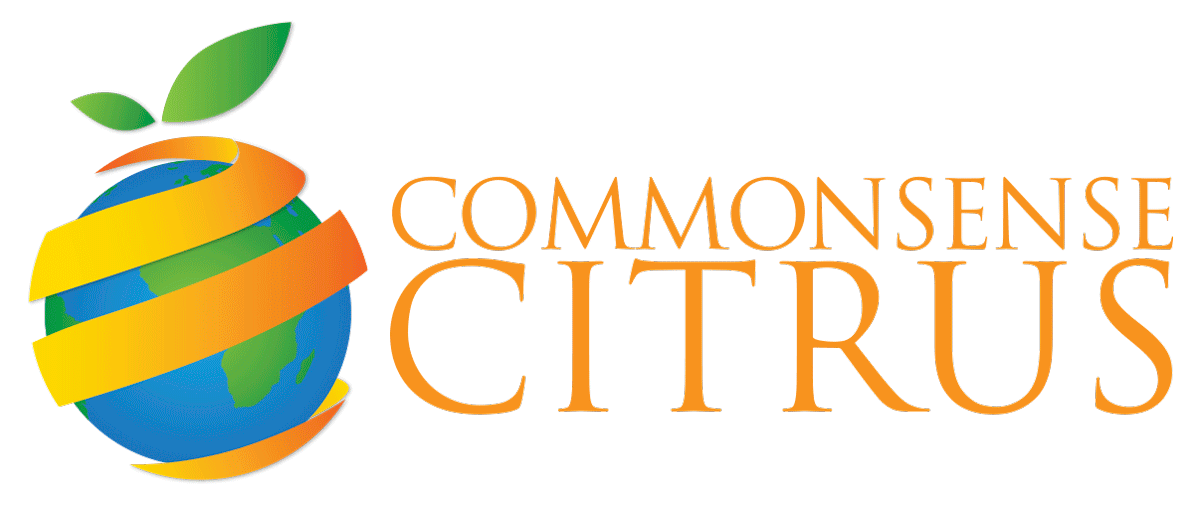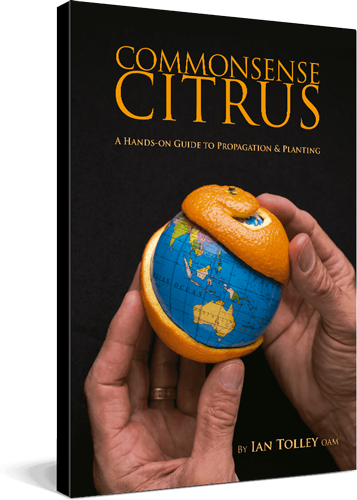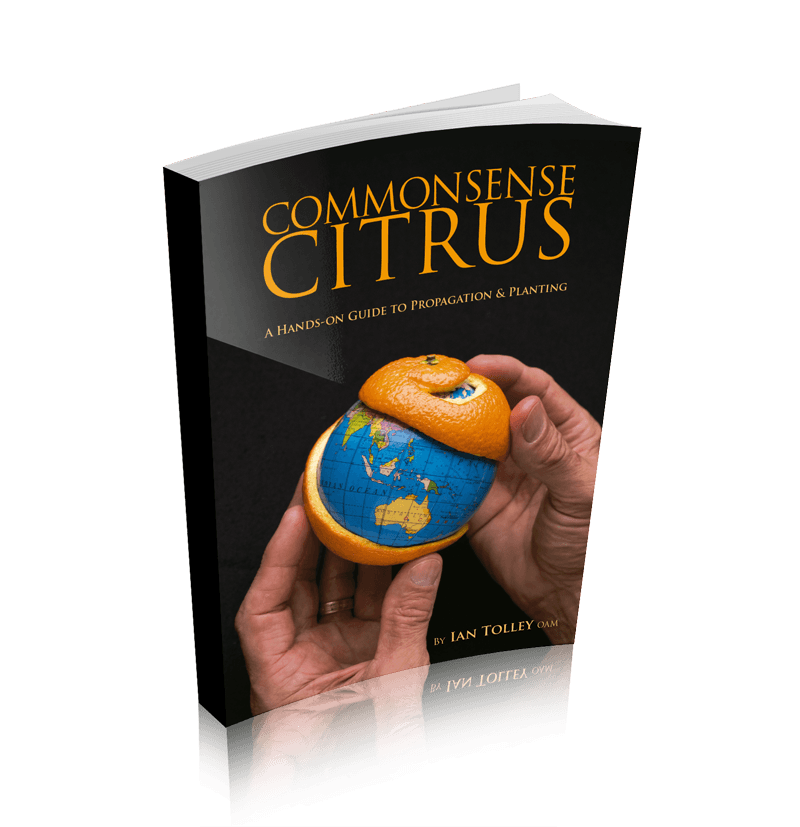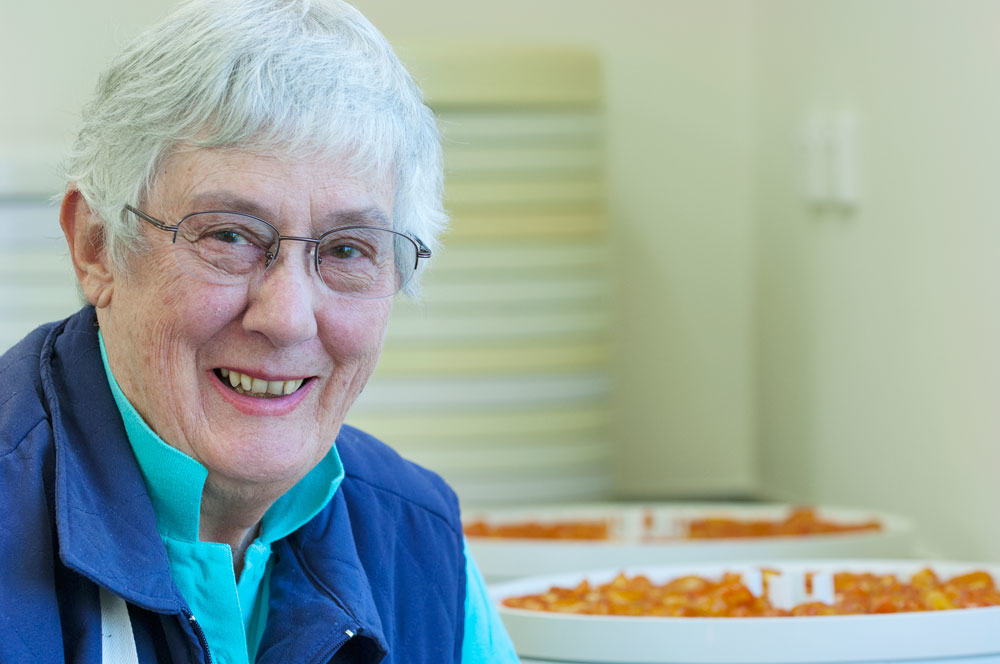Tolley’s Nurseries Pty Ltd is located in Renmark South Australia and has operated for 3 generations as a family company.
Ian Tolley is a specialist and global expert in seed production, seedling production, orchard planning establishment and management. He was awarded an OAM, Medal of the Order of Australia, for his lifelong services to development of the Australian citrus industry. Ian is also a Fellow of the Winston Churchill Memorial Trust.
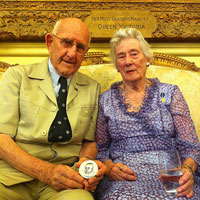
Noelle Tolley managed the development of Tolley’s containerized citrus nursery and has participated in many international horticultural congresses. She was awarded the AM as a Member of the General Division of the Order of Australia for services to the Australian horticultural industry, and business women.
BOOK PREVIEW
BOOK CONTENTS
Page 7: About the Author
Page 8: Introduction to a World Traveller
Page 13: Fruit Quality Standards
Page 14: Navel Oranges
Page 15: Sweet Oranges
Page 17: Sour Oranges and Variants
Page 18: Grapefruit
Page 20: Tangelos
Page 21: Pummelo (or Shaddock)
Page 22: Mandarins
Page 24: Lemons
Page 29: Citron
Page 30: Limes
Page 32: Ornamentals & Varieties of Special Interest
Page 36: A Passion for Citrus Blossom
Page 39: Native Limes of Australia
Page 41: Finger Limes
Page 49: Rootstock Selection
Page 50: Avoiding Incompatibility Issues
Page 51:Widely Used Citrus Rootstocks
Page 52: Citrus Rootstock Characteristics
Page 54: Dwarfing and Semi-Dwarfing Rootstocks
Page 54: Deciduous and Evergreen Rootstocks
Page 54: Mistaken Identity? – The History of Carrizo and Troyer Citrange Rootstocks
Page 55: Other Rootstock Varieties
Page 56: Citrus Rootstocks in Australia – A Timeline of Trials, Tribulations and Successes
Page 58: Commercial Development of New Rootstock/Scion Combinations
Page 63: Planning Considerations
Page 64: Water Supply & Water Security
Page 64: Drainage
Page 64: Effects of Climate Change
Page 65: Chemical Storage
Page 65: Business Infrastructure
Page 66: Mulching
Page 67: Weed Control
Page 68: Soil Preparation
Page 69: Ground Cover
Page 70: Drainage & Irrigation
Page 71: Windbreaks
Page 74: Planting
Page 76: Citrus Orchard Design
Page 78: Tolley’s Macro-pots
Page 82: Ornamental Citrus Plantings for Streets, Gardens and Communities
Page 91: Visual Signs of Nutrient Deficiencies
Page 92: Essential Nutrient Elements
Page 93: Leaf Analysis
Page 93: Treatment of Common Deficiencies for Home Gardens
Page 94: Soil Quality
Page 95: Soil Analysis
Page 96: Active Pest and Disease Management
Page 97: Pests
Page 97: Integrated Pest Management
Page 98: Common Citrus Pests in Australia
Page 105: Diseases
Page 105: Fungal Problems
Page 108: Common Viral and Viroid Problems
Page 109: Greening Disease
Page 113: Tree Management
Page 113: Early Tree Shaping
Page 114: Tools and Equipment for Tree Shaping and Pruning
Page 116: Orchard Shaping
Page 118: Crop Regulation
Page 119: Pruning Tips for Home Gardens
Page 120: Small Tree Pruning
Page 122: Large Tree Pruning
Page 124: Espaliered Fruit Trees
Page 125: Orchard Curiosities
Page 129: General Considerations
Page 129: Media Components
Page 130: Substrates
Page 131: Composting Substrates
Page 133: Physical Characteristics
Page 135: Chemical Characteristics
Page 135: Nutrient Levels
Page 136: Additives to the Choice of Substrate
Page 137: Examples for Growing Media Formulas for Citrus
Page 137: Quality Control of Growing Media
Page 138: Sustainable Growing Media
143: Seed
143: Seed Trees
144: Harvesting
145: Seed Extraction
146: Tolley’s Shredding/Vibrating Unit
148: Seed Cleaning
149: Seed Hot Water Treatment
149: Fungicidal Treatment
149: Seed Hygiene
149: Drying Seed
150: Seed Hot water and Fungicidal Treatment at Tolley’s Nurseries
151: Seed Storage
151: Germination Testing
153: From Seed To Seedling
154: Peeling Seed
155: The Germination Cabinet
156: Planting Considerations
156: Planting Procedure
158: Post-seed Planting Care
159: Raising Seedlings
159: Production Options, Grading and Potting
159: Container Sizes
160: Time Guidelines
161: Seedling Grading
164: Potting Seedlings
164: Repotting Larger Plants
165: Watering in
165: Staking Trees
165: Good Practice in Nurseries
165: Container Placement after Potting
167: Citrus Propagation
168: Plant Physiology
169: Propagation Techniques Overview
170: Sourcing Budwood
171: Selecting Bud Size
172: Tools and Equipment for Budding and Grafting
175: Budding Techniques for Citrus
175: Preparations
175: Bud handling
176: Budding Position
176: Planning, Posture and Productivity
176: Callousing
177: The Drawbacks of Conventional vs. Micro-Budding
178: T Budding
180: Micro-Budding
182: Chip Budding
184: Micro-Chip Budding
186: Apical Budding
189: Grafting Techniques for Citrus
189: Preparations
190: Cleft Grafting
194: Micro-Grafting
196: Mini-Grafting
198: Interstock Grafting
199: Inarching
202: Top Working by Budding or Grafting
202: Preparation of Trees
202: Process of Top Working
202: Aftercare After Budding
203: Bark Grafting
204: Marcotting
205: Tree Care during Growing on
205: Watering
206: Fogging vs. Misting
207: Removing Budding Ties
208: Topping
208: Sucker Removal
209: Producing a Straight, Single Pole Tree
209: Colour-Coding your Trees
Page 212: Increasing Soil Carbon in Farms and Gardens by Alan Broughton
Page: 216: Innovation and Inventions
Page 220: Glossary
Page 221: References & Recommended Reading
Page 222: Index of Citrus Varieties
Page 223: Index of Rootstocks
Page 223: Index of Keywords
CONTACT
TOLLEY’S NURSERIES
Note: Due to the popularity of his Books and ABC Television and Radio programs, Ian receives an extraordinary amount of telephone calls and email questions on horticultural issues. Ian kindly requests that in the first instance you consult Commonsense Citrus’s contents to see if the book provides the answer you require. Commonsense Citrus is a representation of his life’s work in horticulture and provides an unequalled compendium of practical advice.
Mailing Address: PO Box 2, Renmark 5341, South Australia
Nursery Address: 152 Tarcoola Street, Renmark 5341, South Australia
